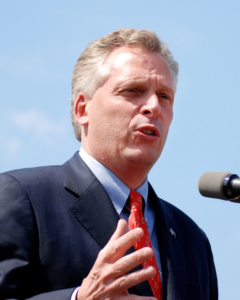 by James C. Sherlock
by James C. Sherlock
Terry McAuliffe demonstrated as governor that he will fight public charter schools.
He will oppose them regardless of the lifelong costs to the students of some truly pitiful Virginia public schools, many with majorities of minority students.
When governor, he vetoed a major attempt by the General Assembly to help those kids.
Indeed, not a single charter school has been approved by the Virginia Board of Education since the McAuliffe administration took office in 2014. Two, subject to reauthorization by hostile Boards, have closed.
He and his supporters in the unions and the ed schools consider the children be acceptable collateral damage to their policy preferences.
McAuliffe in 2017 vetoed a bill that the Washington Post reported:
“would have eased the creation of charter schools, delivering a blow to the push to increase the number of charters in a state where they have struggled to gain a foothold.”
The bill from the Republican-led legislature would have permitted the state education board to create regional charter school districts for school systems that have at least one chronically under-performing school and appoint boards to oversee the creation of charter schools in those areas.
Bill sponsors Sen. Mark D. Obenshain (R-Rockingham) and Del. R. Steven Landes (R-Augusta) said charter schools would offer a “lifeline” for children stuck in schools that have repeatedly failed to meet state benchmarks. The bill, they said, could have expanded options in a state that has been historically hostile to charter schools.
Virginia has nine (now seven) charter schools. That is one of the lowest totals in the nation.
McAuliffe said in a statement Thursday that the bill is “in conflict with the Constitution of Virginia” because it strips local school boards of authority to make decisions about public schools in their own jurisdictions and would have shifted education funding away from mainstream public schools.
McAuliffe also vetoed a bill that would have required schools to notify parents when students are assigned educational materials that are deemed sexually explicit, calling the bill unnecessary and potentially burdensome for educators. The bill would have required schools to provide alternative materials for students who opted out of books deemed sexually explicit.
Can you spell union campaign donations, boys and girls? For some, likely not.
As for McAuliffe’s “unconstitutional” excuse, the Virginia Constitution contains one statement on the subject:
Article VIII. Education
Section 7. School boards
The supervision of schools in each school division shall be vested in a school board, to be composed of members selected in the manner, for the term, possessing the qualifications, and to the number provided by law.
The bill he vetoed specifically permitted the establishment of new divisions and new boards. That is why the language of the bill was chosen — to comply with the constitution.
Poison pills in current laws. In Virginia there are now more than twice as many state laws on charter schools (15) as charter schools themselves (7).
Those laws contain provisions that build a formidable barrier to new charters and threaten existing ones.
It is important that Virginians, in the midst of the most intense focus on public education since Massive Resistance, understand those laws, either to know what they want to change or know what, exactly, they are supporting.
Read them. See Article 1.2. Establishment of Charter Schools. Those laws taken together constitute a nearly impenetrable wall. They ensure the vast majority of Virginia children will not benefit from them.
They provisions include:
“A public charter school shall be administered and managed by a management committee, composed of parents of students enrolled in the school, teachers and administrators working in the school, and representatives of any community sponsors, in a manner agreed to by the public charter school applicant and the local school board.”
None of the best charter school corporations can agree to those terms. Their management practices are the core of their value to students.
“Public charter school applications shall be received and reviewed by the Board of Education and local school boards or, in the case of a regional public charter school, by all of the relevant school boards”
A “no” can come from either review, and often will.
“The (State) Board (of Education)’s review shall examine such applications for feasibility, curriculum, financial soundness, and other objective criteria as the Board may establish, consistent with existing state law.”
All criteria should be established in law. Otherwise charter schools, which operate on a five year license, are at the mercy of the whims of politically appointed Boards of Education.
“At the discretion of the local school board, charter school personnel may be employees of the local school board, or boards, granting the charter.”
“Professional, licensed education personnel may volunteer for assignment to a public charter school. Assignment in a public charter school shall be for one contract year.”
That is the final poison pill.
It takes a public charter school system like Success Academies at least a year to train its staff and teachers to Success Academy standards. Success Academy runs its own educational institute and conducts extensive hands-on mentoring to achieve those standards.
Finally, even readers who instinctively disfavor charter schools should read the laws. They will find requirements and protections that some who comment here clearly think do not exist.
Terry McAuliffe does not care.

Leave a Reply
You must be logged in to post a comment.